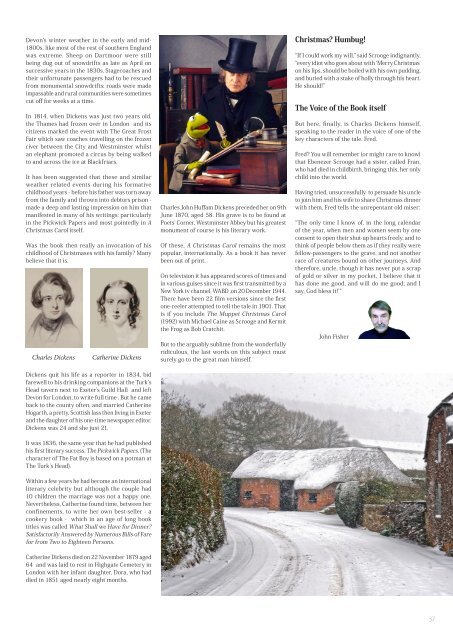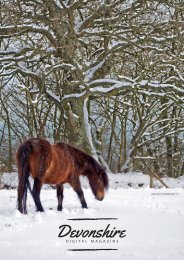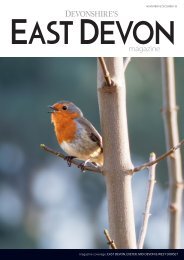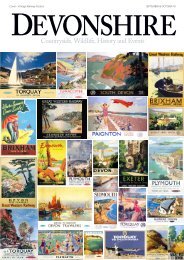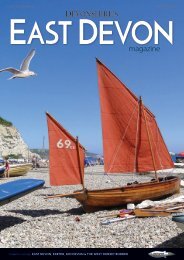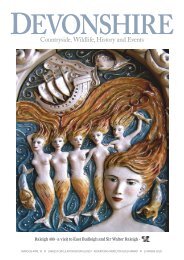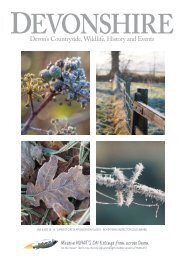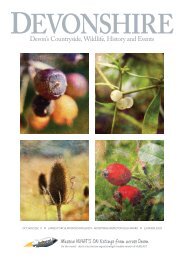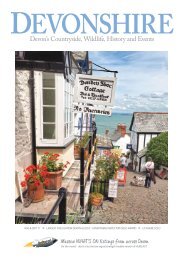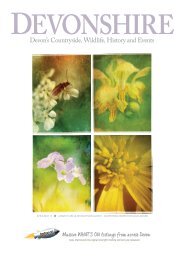Devonshire magazine November December 2018
Devon's countryside, wildlife, history and events! Including a massive Christmas section with events and gift ideas from across the county and our Shop Local scheme.
Devon's countryside, wildlife, history and events!
Including a massive Christmas section with events and gift ideas from across the county and our Shop Local scheme.
Create successful ePaper yourself
Turn your PDF publications into a flip-book with our unique Google optimized e-Paper software.
Devon’s winter weather in the early and mid-<br />
1800s, like most of the rest of southern England<br />
was extreme. Sheep on Dartmoor were still<br />
being dug out of snowdrifts as late as April on<br />
successive years in the 1830s. Stagecoaches and<br />
their unfortunate passengers had to be rescued<br />
from monumental snowdrifts: roads were made<br />
impassable and rural communities were sometimes<br />
cut off for weeks at a time.<br />
In 1814, when Dickens was just two years old,<br />
the Thames had frozen over in London and its<br />
citizens marked the event with The Great Frost<br />
Fair which saw coaches travelling on the frozen<br />
river between the City and Westminster whilst<br />
an elephant promoted a circus by being walked<br />
to and across the ice at Blackfriars.<br />
It has been suggested that these and similar<br />
weather related events during his formative<br />
childhood years - before his father was torn away<br />
from the family and thrown into debtors prison -<br />
made a deep and lasting impression on him that<br />
manifested in many of his writings: particularly<br />
in the Pickwick Papers and most pointedly in A<br />
Christmas Carol itself.<br />
Was the book then really an invocation of his<br />
childhood of Christmases with his family? Many<br />
believe that it is.<br />
Charles Dickens<br />
Catherine Dickens<br />
Dickens quit his life as a reporter in 1834, bid<br />
farewell to his drinking companions at the Turk’s<br />
Head tavern next to Exeter’s Guild Hall and left<br />
Devon for London, to write full time . But he came<br />
back to the county often, and married Catherine<br />
Hogarth, a pretty, Scottish lass then living in Exeter<br />
and the daughter of his one-time newspaper editor.<br />
Dickens was 24 and she just 21.<br />
Charles John Huffam Dickens preceded her on 9th<br />
June 1870, aged 58. His grave is to be found at<br />
Poets’ Corner, Westminster Abbey but his greatest<br />
monument of course is his literary work.<br />
Of these, A Christmas Carol remains the most<br />
popular, internationally. As a book it has never<br />
been out of print.<br />
On television it has appeared scores of times and<br />
in various guises since it was first transmitted by a<br />
New York tv channel, WABD ,on 20 <strong>December</strong> 1944.<br />
There have been 22 film versions since the first<br />
one-reeler attempted to tell the tale in 1901. That<br />
is if you include The Muppet Christmas Carol<br />
(1992) with Michael Caine as Scrooge and Kermit<br />
the Frog as Bob Cratchit.<br />
But to the arguably sublime from the wonderfully<br />
ridiculous, the last words on this subject must<br />
surely go to the great man himself.<br />
<br />
“If I could work my will,” said Scrooge indignantly,<br />
“every idiot who goes about with ‘Merry Christmas’<br />
on his lips, should be boiled with his own pudding,<br />
and buried with a stake of holly through his heart.<br />
He should!”<br />
<br />
But here, finally, is Charles Dickens himself,<br />
speaking to the reader in the voice of one of the<br />
key characters of the tale. Fred.<br />
Fred? You will remember (or might care to know)<br />
that Ebenezer Scrooge had a sister, called Fran,<br />
who had died in childbirth, bringing this, her only<br />
child into the world.<br />
Having tried, unsuccessfully to persuade his uncle<br />
to join him and his wife to share Christmas dinner<br />
with them, Fred tells the unrepentant old miser:<br />
“The only time I know of, in the long calendar<br />
of the year, when men and women seem by one<br />
consent to open their shut-up hearts freely, and to<br />
think of people below them as if they really were<br />
fellow-passengers to the grave, and not another<br />
race of creatures bound on other journeys. And<br />
therefore, uncle, though it has never put a scrap<br />
of gold or silver in my pocket, I believe that it<br />
has done me good, and will do me good; and I<br />
say, God bless it!’”<br />
John Fisher<br />
It was 1836, the same year that he had published<br />
his first literary success, The Pickwick Papers. (The<br />
character of The Fat Boy is based on a potman at<br />
The Turk’s Head).<br />
Within a few years he had become an international<br />
literary celebrity but although the couple had<br />
10 children the marriage was not a happy one.<br />
Nevertheless, Catherine found time, between her<br />
confinements, to write her own best-seller - a<br />
cookery book - which in an age of long book<br />
titles was called What Shall we Have for Dinner?<br />
Satisfactorily Answered by Numerous Bills of Fare<br />
for from Two to Eighteen Persons.<br />
Catherine Dickens died on 22 <strong>November</strong> 1879 aged<br />
64 and was laid to rest in Highgate Cemetery in<br />
London with her infant daughter, Dora, who had<br />
died in 1851 aged nearly eight months.<br />
37


